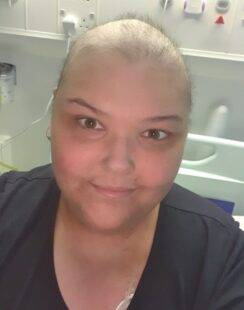To view this video please enable JavaScript, and consider upgrading to a web
browser that
supports HTML5
video
Young cancer patients are ‘draining their bank accounts’ to afford travelling to their treatment.
Almost three-quarters of patients and their families are worried about spending nearly £300 a month to go to hospitals for chemotherapy and radiotherapy.
Many travel up to 350 miles a month, with some even undertaking 100-mile round trips up to five times a week to get to hospital.
Most are only able to journey by car as their immune systems are too fragile for public transport, meaning families have to find a way to afford the cost of petrol, congestion charges and taxis.
One in 10 patients have even missed or delayed a treatment appointment because they couldn’t afford it, according to research from Young Lives vs Cancer.
Now, charities and patients are calling for government financial support to those who ‘are just expected’ to be able to fund the cost.
Kathryn, 22 from Flintshire, said when she was diagnosed with stage 2 Hodgkin Lymphoma in 2019, she ‘became really worried’ after seeing how much it cost to get to hospital.
She told Metro.co.uk: ‘I was in The Christie Hospital in Manchester up to five times a week. It was a 100-mile-round trip to get to and from my home in North Wales, and was about £14 a trip in petrol costs when I first started treatment.
Kathryn was diagnosed with stage 2 Hodgkin’s Lymphoma in 2019
‘My parents and I had to pay for this ourselves, and taking trains or buses wasn’t an option because my immune system was in such a terrible state.
‘We started to become really worried about the cost of travel, because we don’t have much money.
‘I shouldn’t have to worry about that when I’m receiving life-saving treatment.’
Eventually, Kathryn and her family were given a grant – but it was not nearly enough, and the travel desk at the hospital closed soon after.
‘Eventually someone helped me look into grants, but that didn’t cover much because we were only offered £10 reimbursement. It also didn’t factor in all the rush hour queues we were stuck in,’ she said.
She said she became ‘worried’ after she saw how much the cost of travel was
‘But when Covid happened the travel desk inside the hospital ended up closing. We were told there was another way to apply for travel reimbursements but it was so complicated we just gave up.
‘I also contracted sepsis four times during my treatment, meaning I was in hospital while my mum had to drive back and forth each day, which she didn’t get any help for.’
Although Kathryn has been in remission for the last year and a half, she still requires check ups every four months.
But the cost of travelling to these check ups has become even higher as the cost of living crisis has hit petrol prices.
Charities and patients are calling for government financial support (Picture: Justin Sullivan/Getty Images)
She said: ‘The cost has gone up so much. It now costs about £18 to get there, and I do not get reimbursed for this.’
Kathryn said having access to a fund would have made a ‘huge difference’ whilst she was receiving treatment.
‘Having a fund would have made such a difference for me. When I got my first reimbursement from the hospital I was in my last £200 and was really worried about going into my overdraft.
‘You don’t plan to be diagnosed, but you have to have the money in your bank account to get to treatment.’
You can sign the petition for the creation of a fund here.
The Christie said: ‘We understand the financial pressures that all cancer patients, especially young patients, face when undergoing treatment.
‘At The Christie, we work hard to ensure that patients can claim back the travel expenses they are entitled to.
‘During the pandemic, some teams worked remotely to minimise the footprint on the hospital site and protect patients.
‘Patients could still claim travel expenses through the Healthcare Travel Cost Scheme (HTCS) and were paid either by cheque or bank transfer. Staff were available by telephone or email to support patients with any travel expense claims.’
Get in touch with our news team by emailing us at [email protected].
For more stories like this, check our news page.
‘You don’t plan to be diagnosed, but you have to have the money in your bank account to get to treatment.’





